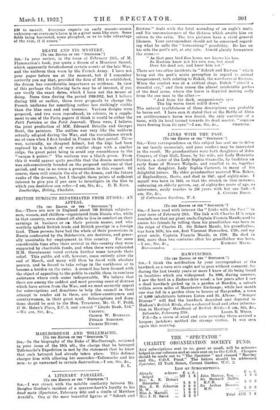A LITERARY PARALLEL.
[To THE EDITOR OF THE " SPECTATOR."] SIR,—I was struck with the notable similarity between Mr. Douglas Gordon's incident of a sparrow-hawk's loyalty to his dead mate (Spectator, February 4th) and a simile of Matthew Arnold's. One of the most beautiful figures of " Sohrab and
RuStunt" deals with the fatal wounding of an eagle's mate, and his unconsciousness of the distress which awaits him on return to the eyrie. The two pictures have a vivid general likeness. Your correspondent should not be concerned regard- ing what he calls the "humanizing" possibility. He has on his side the poet's art, at any rate. Arnold plainly humanizes the scene :— " As that poor bird flies home, nor knows his lees, So Rustum knew not his own son, but stood . Over his dead son, and knew him not."
There are two other incidents in "Sohrab and Rustum " which bring out the poet's acute perception in regard to animal temperament, both relating to Ruksh, the war-horso of RUFAHM. When the combat was at a critical stage, Ruksh " utter'd it dreadful cry," and then comes the almost intolerable pathos of the final scene, where the horse is depicted moving sadly from the one man to the other :—
"And from his dark, compassionate eyes The big warm tears roll'd down." •
The natural truthfulness of these descriptions can probably be borne out. •I have seen it stated that at the Battle of Alma an artilleryman's horse was found, the only survivor of a team, with its head turned towards its dead master, "copious tears flowing from its eyes."—I am, Sir, &c., OBSERVER.


































 Previous page
Previous page